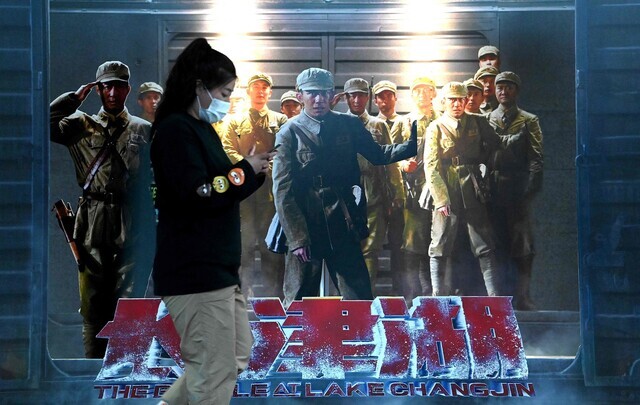hankyoreh
Links to other country sites 다른 나라 사이트 링크
[Column] Why we should be wary of China’s renewed interest in the Korean War

The Korean War is currently a hot commodity at the Chinese box office. “The Battle at Lake Changjin,” a film depicting a Korean War battle also known as the Battle of Chosin Reservoir, is on track to become China’s highest-grossing film of all time.
Co-directed by Chen Kaike and Tsui Hark, “The Battle at Lake Changjin” cost a record 1.3 billion yuan (US$202 million) to produce. But just 11 days after opening, it had already pulled in more than 4 billion yuan (US$621.44 million) in ticket sales.
Why was this film made in China right now? Films about the Korean War — which is officially known in China as “The War to Resist US Aggression and Aid Korea” — have been either endorsed or dismissed in China, depending on how the political winds are blowing. The 1950s and 1960s, at the height of the Cold War, saw the production of popular Korean War films such as “Battle on Shangganling Mountain” (1956) and “Heroic Sons and Daughters” (1964).
But such films nearly vanished after the Sino-US detente in the 1970s. China made it taboo to talk about the Korean War, given its relationship with South Korea and the US, and many Chinese even argued that China’s intervention in the Korean War had been a bad decision that only harmed China.
But that trend was reversed after Chinese President Xi Jinping came to power. Xi has emphasized the historical interpretation that China’s military intervention in the Korean War was just. That emphasis signifies two things. First, it means that the Chinese Communist Party was correct to intervene in the war and that no more criticism of China’s involvement will be tolerated. Political propaganda suggesting that China will fight and ultimately defeat the US has gained significance since the new Cold War between the US and China began in 2018.
“The Battle at Lake Changjin” attributes the following line to Mao Zedong: “The Yankees may look down on us, but we’ll gain our dignity by fighting this war.”
But such patriotic propaganda is also intended to control the grievances caused by rising unemployment and inequality. “The Battle at Lake Changjin” is one of several films about the Korean War to be released in recent years, including “My War” (2016) and “The Sacrifice” (2020), as well as “Sniper,” a film by Zhang Yimou that’s about to be released.
But was the Battle at Lake Changjin actually a Chinese victory over the US as presented in the Chinese government’s propaganda? On Nov. 27, 1950, 30,000 American soldiers and 700 Korean soldiers were surrounded by 120,000 Chinese soldiers in a brutal winter that got down to 40 degrees below zero. The UN forces broke out of the Chinese entrapment after 17 days of fighting and managed to be evacuated from the Port of Hungnam. While 7,338 American soldiers were killed, the Chinese are also estimated to have lost between 40,000 and 80,000 soldiers.
Rather than debate which side “won” the battle,” we might do well to treat it as a reminder of the horrors of war.
What does China’s interpretation of the Korean War mean for Korea? By only considering the outcome of the battle for the two superpowers of the US and China, it fails to consider Koreans’ position, not to mention their sacrifice. Xi’s declaration that China fought a just war in which it resolutely defeated the “intruder” disregards the historical fact that the war was started when North Korea invaded with support from China and the Soviet Union.
The issue of China’s participation in the Korean War came up when South Korea and China were negotiating the establishment of diplomatic relations in 1992. In his memoirs, then South Korean Foreign Minister Lee Sang-ok recalls that the South Koreans asked the Chinese for an explanation, “in light of the serious harm and sacrifices imposed on Korean citizens because of [China’s] participation in the war.” But China objected that “raising a historical issue from long ago” would only “provoke unnecessary debate.”
But now China is bringing back up “a historical issue from long ago” and exploiting it with the political goal of bolstering patriotism.
In his book “A Dialogue Between South Korean and Chinese History Textbooks,” Oh Byeong-su, a researcher at the Northeast Asian History Foundation, argues that under Xi Jinping, China has been reframing not only the Korean War but its entire historical narrative in an attempt to forge a new “state identity.”
“China in premodern times is presented as a ‘cultural empire,’ with emphasis placed on the integration of ethnic minorities under the state and China’s hierarchical relationship with its neighbors. In modern and contemporary history, the historical relationship between China, as a non-Western power, and its neighbors is reduced to a relationship between powerful and weak states. China is building an argument for legitimizing a great power’s intervention throughout the regional order in East Asia,” Oh writes.
We should be cautious when China starts talking about powerful and weak countries, or the Chinese suzerain and its old vassal states, rather than an equal relationship with its neighbors.
Is everyone in China so passionate about the canned patriotism of “The Battle at Lake Changjin”? The state-run press is full of glowing reviews, and photos are circulating online of viewers standing up and saluting the film.
But there are also plenty of dissenting viewpoints and critiques that are removed by censors. Former journalist Luo Changping was arrested and is being questioned for an acerbic post on social media in which he wrote, “Half a century later, few Chinese people have reflected on the justifiability of the war.”
We need to remember that there are many in China who question patriotism imposed from above.

By Park Min-hee, editorial writer
Please direct questions or comments to [english@hani.co.kr]

Editorial・opinion
![[Guest essay] The real reason Korea’s new right wants to dub Rhee a founding father [Guest essay] The real reason Korea’s new right wants to dub Rhee a founding father](https://flexible.img.hani.co.kr/flexible/normal/500/300/imgdb/original/2024/0423/8317138574257878.jpg) [Guest essay] The real reason Korea’s new right wants to dub Rhee a founding father
[Guest essay] The real reason Korea’s new right wants to dub Rhee a founding father![[Column] ‘Choson’: Is it time we start referring to N. Korea in its own terms? [Column] ‘Choson’: Is it time we start referring to N. Korea in its own terms?](https://flexible.img.hani.co.kr/flexible/normal/500/300/imgdb/original/2024/0423/3617138579390322.jpg) [Column] ‘Choson’: Is it time we start referring to N. Korea in its own terms?
[Column] ‘Choson’: Is it time we start referring to N. Korea in its own terms?- [Editorial] Japan’s rewriting of history with Korea has gone too far
- [Column] The president’s questionable capacity for dialogue
- [Column] Are chaebol firms just pizza pies for families to divvy up as they please?
- [Column] Has Korea, too, crossed the Rubicon on China?
- [Correspondent’s column] In Japan’s alliance with US, echoes of its past alliances with UK
- [Editorial] Does Yoon think the Korean public is wrong?
- [Editorial] As it bolsters its alliance with US, Japan must be accountable for past
- [Guest essay] Amending the Constitution is Yoon’s key to leaving office in public’s good graces
Most viewed articles
- 1[Guest essay] The real reason Korea’s new right wants to dub Rhee a founding father
- 2Why Korea shouldn’t welcome Japan’s newly beefed up defense cooperation with US
- 3Terry Anderson, AP reporter who informed world of massacre in Gwangju, dies at 76
- 4[Column] ‘Choson’: Is it time we start referring to N. Korea in its own terms?
- 5[Column] The clock is ticking for Korea’s first lady
- 6Opposition calls Yoon’s chief of staff appointment a ‘slap in the face’
- 7Senior doctors cut hours, prepare to resign as government refuses to scrap medical reform plan
- 8New AI-based translation tools make their way into everyday life in Korea
- 9[Editorial] Japan’s rewriting of history with Korea has gone too far
- 10[Column] Are chaebol firms just pizza pies for families to divvy up as they please?